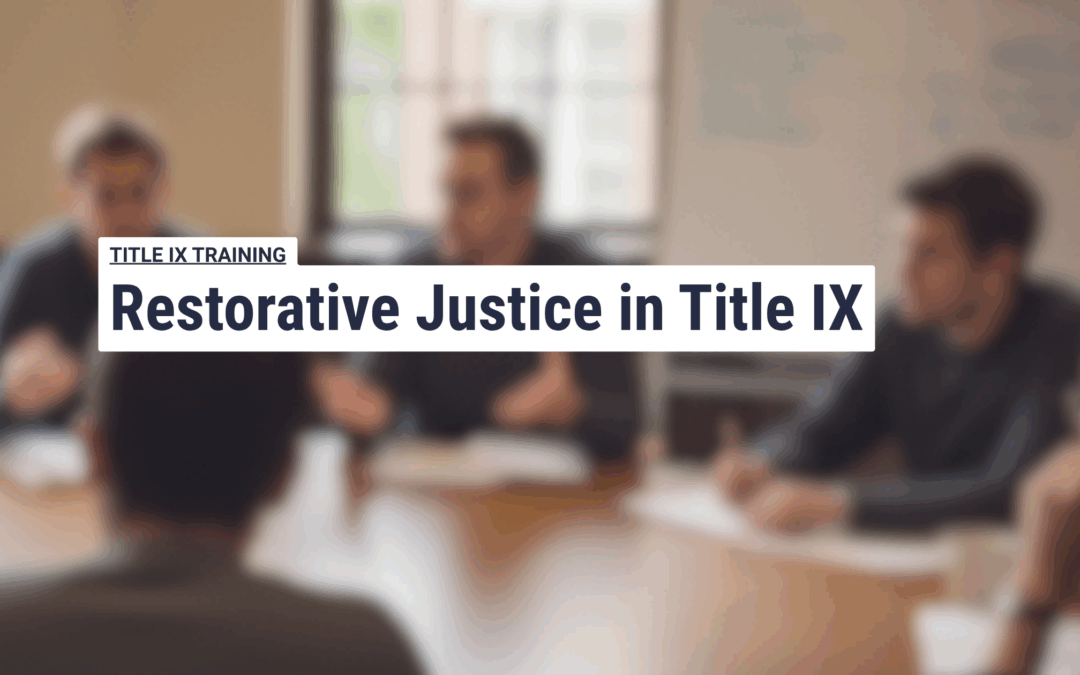Learn more about how informal resolution fits within the Title IX process in our related article, What You Need to Know About Title IX Informal Resolution.
After a Title IX complaint is filed, two main paths come to mind: the formal grievance process and the informal resolution process. Though not appropriate in every case, parties often prefer the informal resolution path because it can feel less adversarial than the formal grievance process due to its emphasis on accountability, education, and repair.
There are various ways to approach informal resolution, including traditional mediation and restorative justice. Both are voluntary and compliant with Title IX regulations, but the restorative justice lens is distinct as it focuses on accepting responsibility and repairing harm.
What Is Restorative Justice in Title IX?
Restorative justice is a structured, facilitated process that brings together those who have been harmed and those who have caused harm to discuss impact, responsibility, and what’s needed to make things right.
While mediation aims to help parties reach an agreement, restorative justice requires the person who caused harm to accept responsibility before the process begins. Of course, restorative justice is not for everyone, but that shift—from dispute resolution to harm repair—makes the informal resolution process especially powerful in cases where both parties want to move forward collaboratively and find closure through understanding.
Rooted in education and empathy, restorative justice invites participants to learn from the incident, rebuild trust, and restore relationships within the campus community.
The Coordinator’s Role
Title IX coordinators play a vital role in ensuring restorative justice processes are appropriate, voluntary, and compliant. Their responsibilities include:
- Presenting options so parties understand all available resolution pathways
- Screening for suitability, ensuring restorative justice is safe and appropriate for both parties (and not used in cases involving both student complainants and employee respondents)
- Engaging a trained facilitator to guide the process and maintain emotional and physical safety
- Documenting agreements and ensuring outcomes align with institutional policy
When used thoughtfully, restorative justice expands the coordinator’s toolkit—offering a process that supports learning, accountability, and compassion while maintaining compliance.
Why Choose Restorative Justice?
Restorative justice can be transformative—for the individuals involved and for the campus community.
It helps participants move beyond procedural outcomes to genuine understanding and accountability.
Research on restorative practices in other fields, including findings from The Effect of Restorative Justice Practices on Crime Victims: A Meta-Analysis, has shown measurable benefits in satisfaction and reduced recidivism. Specifically, restorative processes resulted in:
- A 14% reduction in reoffending
- 85% of participants reporting satisfaction with the process
- 62% of participants feel better after an incident
For coordinators, restorative justice offers a meaningful way to resolve cases that promotes healing, closure, and community trust in the Title IX process.
Want to Go Deeper?
For those looking to build confidence and capacity around Informal Resolution, explore the following resources:
- Check out our advanced Title IX restorative justice training at the IX Institute.
- Title IX Solutions offers outsourced Informal Resolution services led by experienced, neutral facilitators.
- Watch our Informal Resolution overview on-demand – Hear directly from our experts as they break down real-world applications and answer key questions.
- Enroll in our Informal Resolution Certificate Course at the IX Institute to gain practical tools and earn a credential in this growing area of practice.
If you still have questions or aren’t sure what kind of support your campus needs, we’re here to help.
Please Note: The information provided in this article is for educational purposes only and is not intended to be legal advice. We recommend seeking independent legal advice concerning the issues presented in evaluating a particular incident.
Looking for in-depth Title IX Restorative Justice Training? Check out our advanced course at the IX Institute.
This advanced one-hour course provides advanced, practical insight into how restorative justice principles can inform informal resolution policies under Title IX and explores how restorative frameworks help students understand impact, repair harm, and maintain agency in the process—while ensuring fairness and compliance.



